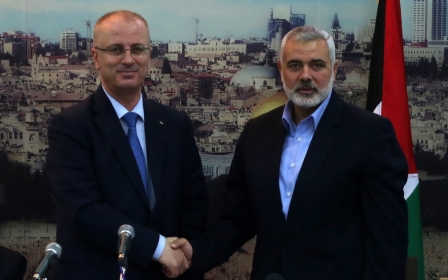Hamas leader says Israeli PM 'playing with fire'

The political leader of Hamas warned in a television interview that Israel's prime minister is "playing with fire" and responsible for the deaths of five Israelis in an attack on a West Jerusalem synagogue last month.
Khaled Meshaal told UK-based Sky News in an exclusive interview broadcast on Friday that the Israeli-Palestinian crisis "will lead to chaos" and create a "bloodbath" in the region if it remains unsolved.
"We warn against keeping the Palestinian issue without a solution and stripping the Palestinian people of hope," he said.
Talking about the recent attacks which shook Jerusalem and tensions over the Al-Aqsa Mosque, Meshaal laid responsibility on Netanyahu for the rise of violence.
"For every action there’s a reaction," Meshaal said. "The action of the occupation targeting the Islamic and the Christian Holy sites in Jerusalem and Palestine, and specifically the Al Aqsa Mosque, brings about the angry Palestinian reaction."
"Our fight is a national fight, but Netanyahu is turning it into a religious fight. He bears responsibility for the consequences of what is happening," he added.
Meshaal, who lives in Doha after leaving Damascus in 2012 when Hamas openly declared its support for the Syrian people against President Bashar al-Assad, made key comments on a variety of topics.
On recent 'lone wolf' attacks in Jerusalem:
"The Palestinian people no longer have anything to lose in light of the continuation of the occupation and settlements, stealing the land, the attacks on women and children, and the Holy sites. This is spontaneous. The reaction is spontaneous - from the young Palestinian men and young Palestinian women."
On whether he has lost confidence in Palestinian president Mahmoud Abbas:
"We stand together in our battle against occupation. That's from one point of view. But from another point of view, yes, the Palestinian-Israeli security cooperation is unacceptable, to the public and on the national level, especially in light of what the Israeli occupation is doing through its continued acts of aggression."
On the recent votes in European parliaments to recognise Palestinian statehood:
"We appreciate those new steps, like the voting in the parliaments in Britain, France, Spain and also the recognition of the Swedish government of the Palestinian state. And also the very brave stands in Latin America, Southern Africa, countries in Asia and the rest of the world - we are noticing this excellent development. We ask for more."
On the status of the Palestinian unity government and whether armed resistance has a place in it:
"Reconciliation is a national necessity and we must hold onto it. We in Hamas are committed to it . . . What we agreed on in the reconciliation years ago, whether in Cairo or Doha and also in the national reconciliation document in 2006 - it talks about the right of the people to resistance. All the factions are the same, nobody rejects resistance . . . We never agreed, at any stage in the process of reconciliation to abandon resistance, because this is rejected on a national level, but we do ask for finding a common strategy on how resistance should be run."
On what success would look like to Hamas:
"We reconciled Palestinians with different powers and factions on a solution on June 4th 1967 borders to build a Palestinian state . . . so we can have a state with Jerusalem as its capital, without occupation, without settlements, with refugees allowed back to their homes, and to achieve our national project, our right and our demands. And to build a modern developed state, which has education, technology, democracy, a peaceful transition of power."
Stay informed with MEE's newsletters
Sign up to get the latest alerts, insights and analysis, starting with Turkey Unpacked
Middle East Eye delivers independent and unrivalled coverage and analysis of the Middle East, North Africa and beyond. To learn more about republishing this content and the associated fees, please fill out this form. More about MEE can be found here.




